|
|
 |
Fiche d'espèce de Copépode |
|
|
Calanoida ( Ordre ) |
|
|
|
Clausocalanoidea ( Superfamille ) |
|
|
|
Euchaetidae ( Famille ) |
|
|
|
Paraeuchaeta ( Genre ) |
|
|
| |
Paraeuchaeta rubra Brodsky, 1950 (F,M) | |
| | | | | | | Syn.: | Pareuchaeta rubra Brodsky, 1950 (1967) (p.214, figs.F,M); Tanaka & Omori, 1968 (p.249, figs.F); Arashkevich, 1969 (p.699, figs.F); Minoda, 1971 (p.27); Heptner, 1971 (p.85, figs.F,M); Hattori, 1991 (tab.1, Appendix); Mauchline, 1998 (tab.42);
Pareuchaeta crassa Tanaka, 1958 (p.357, figs.F,M); Furuhashi, 1966 a (p.295, vertical distribution in Oyashio/Kuroshio transitional area, Table 8); Minoda, 1971 (p.27) | | | | Ref.: | | | Bradford & al., 1983 (p.23); Vaupel-Klein, 1970 (p.4, 17, figs.M, Rem.); Park, 1994 (p.320); 1995 (p.42, Rem.F,M, figs.F,M) | 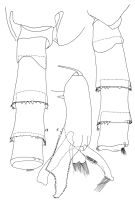 issued from J.C. von Vaupel-Klein in Zool. Verh. Leiden, 1970, 110. [p.18, Fig.5]. Male (from NE Pacific: Station ''P''): a, b, last thoracic somite and urosome (dorsal, lateral view, respectively); c, terminal part of the left fifth leg.
|
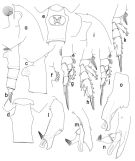 issued from : T. Park in Bull. Scripps Inst. Oceanogr. Univ. California, San Diego, 1995, 29. [p.140, Fig.30]. Female: a, forehead (left side); b, urosome (left); c, d, e, genital somite (left, dorsal, ventral, respectively); f, outer lobe of Mx1; g, P1 (anterior); h, P2 (anterior). Nota: Similar in habitus to P. prudens but distinguishable from it: Laterally, rostrum relatively small;distance between suprafrontal sensilla and beginning of rostrum relatively wide. Supralabrum pointing more forward. Laterally, genital flange with strongly convex ventral margin and very large posterior lobe pointing posteroventrad. Posterior edge of genital field not produced into a distinct lobe. Posterior margin of genital prominence slightly bulging and so weakly inclined that it is nearly even with posterior ventral wall of somite, with a shallow indentation marking where the 2 parts meet. Laterally, dorsal margin of genital somite slightly bulging at middle. Dorsally, as well as ventrally, genital somite strongly asymmetrical with a conspicuous outgrowth next to genital field on left side. Laterally, 2nd urosomal somite with a hump on dorsal margin about 1/3 length from proximal end. Cephalosomal appendages similar to those of P. prudens but 1st endopodal segment of Mx1 with 7 setae and proximalmost seta of outer lobe invariably small. In P1 exopod, outer spine of 2nd segment a little short of reaching base of following outer spine. Male: i, forehead (left); j, P1 (anterior); k, P2 (anterior); l, distal exopodal segments of left 5th leg (anterior, counterclockwise); m, idem (anterior, tilted clockwise); n, idem (medial, tilted counterclockwise); o, second exopodal segment of left 5th leg (lateral, tilted clockwise).
|
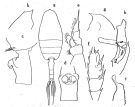 issued from : O. Tanaka in Publs Seto Mar. Biol. Lab., 1958, VI (3). [p., Fig.]. As Pareuchaeta crassa. Female: a, habitus (dorsal); b, forehead (lateral); c, last thoracic segment and genital somite (lateral left side); d, genital somite (ventral); e, P1; f, exopod of P2. Nota: The first 3 urosome segments in 0.01 mm are 100:50:37. Urosome contained 2.3 times in the length of the Prosome. Male: g, forehead (lateral); h, terminal segments of left P5; i, tooth-plate of the same segment. Nota: Prosome:Urosome = 2.19.
|
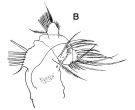 issued from : O. Tanaka & M. Omori in Publs Seto Mar. Biol. Lab., 1968, XVI (4). [p.249, Fig.17]. As Pareuchaeta . Female: B, Mx1 (Nota: outer lobe with 6 long and 1 short setae).
|
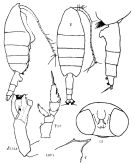 Issued from : K.A. Brodskii in Calanoida of the Far Eastern Seas and Polar Basin of the USSR. Opred. Fauna SSSR, 1950, 35 (Israel Program for Scientific Translations, Jerusalem, 1967) [p.215, Fig.128]. As pareuchaeta rubra. Female (from NW Pacif.): habitus (dorsal and lateral right side); forehead (lateral); S2, P2; urosome (lateral left side); Gf, complex genital (ventral). Male: S5Le, distal segments of left P5.
|
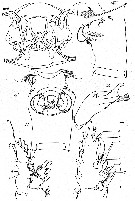 issued from : M.V. Heptner in Trudy. Inst. Okeanol., 1971, 92. [p.86, Fig.5]. As Pareuchaeta rubrq. Female (from Kuril-Kamchatka Trench). Nota: Formula of the exopod of P1 spines on each segment: Aa < 1/3 AB; Bb < BC; Cc ≥ Bc. P2: Aa > AB (Aa = AB + 1/2 Bb); Bb < BC (Bb 2/3 BC); Cc
Male: ld, serrated lamella of left exopod of P5.
|
 Paraeuchaeta rubra Paraeuchaeta rubra Female: 1 - See key to species Groups and independent species of Paraeuchaeta (p.30): malayensis species Group. 2 - Outer spine of 2nd exopodal segment (or the 2nd of the first 2 exopodal segments forming a proximal, compound segment) of P1 normally developed (Fig.30-g). 3 - Outer lobe of Mx1 with 6 long setae in addition to 1 small seta proximally (Fig.30-f). 4 - Genital somite without a conical process on left side close to anterior base of genital prominence (Fig.30-c). 5 - Dorsally and ventrally, genital somite asymmetrical (Fig.30-d).
| | | | | Ref. compl.: | | | ? Lee & al., 1971 (p.1151, 1152); Yamaguchi & Ikeda, 2002 a (p.1); Yamaguchi & al., 2002 (p.1007, tab.1); Yamaguchi & al., 2004 (p.480, tab.2, 3); Shimode & al., 2005 (p.113 + poster); Ikeda & al., 2006 (p.1791, Table 2); Galbraith, 2009 (pers. comm.); Park & Ferrari, 2009 (p.143, Table 8, fig.2, biogeography); Homma & Yamaguchi, 2010 (p.965, Table 2); Homma & al., 2011 (p.29, Table 2, 3, 5, abundance) | | | | NZ: | 5 + 1 douteuse | | |
|
Carte de distribution de Paraeuchaeta rubra par zones géographiques
|
| | | | | | | Loc: | | | China Seas (East China Sea), Japan (Izu region, off Sanriku), Station H, Station Knot, Okhotsk Sea, Bering Sea, S Aleutian Basin, S Aleutian Is., Kuril Is., NE Pacif. (Station 'P'), off NE Hawaii, Pacif. (SE tropical) | | | | N: | 19 | | | | Lg.: | | | (3) F: 7,6-6,8; M: 6,8-6; (22) F: 7,5-7,3; M: 6,1; (23) F: 8,05-7,15; M: 6,95-6,4; (63) F: 7,67-7,21; M: 6,75; (99) F: 7,25-6,95; M: 6,19; (208) F: 7,25-6,65; 6,6; M: 7,2; {F: 6,60-8,05; M: 6,00-7,20} | | | | Rem.: | bathy-abyssopélagique.
Voir aussi les remarques en anglais | | | Dernière mise à jour : 16/12/2016 | |
|
|
 Toute utilisation de ce site pour une publication sera mentionnée avec la référence suivante : Toute utilisation de ce site pour une publication sera mentionnée avec la référence suivante :
Razouls C., Desreumaux N., Kouwenberg J. et de Bovée F., 2005-2026. - Biodiversité des Copépodes planctoniques marins (morphologie, répartition géographique et données biologiques). Sorbonne Université, CNRS. Disponible sur http://copepodes.obs-banyuls.fr [Accédé le 01 février 2026] © copyright 2005-2026 Sorbonne Université, CNRS
|
|
 |
 |









